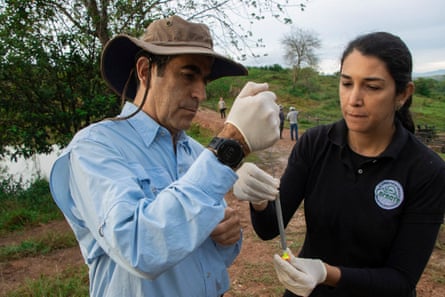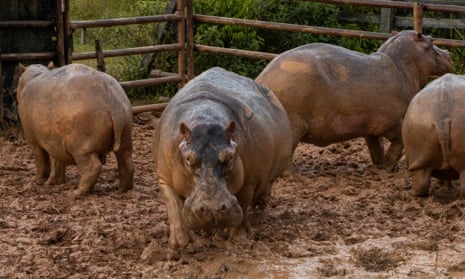A group of rampant hippopotamuses, introduced by the late Colombia drug lord Pablo Escobar to his private zoo, are being sterilized by the country’s wildlife services, after mounting concern that the 80-strong herd presented a potential environmental disaster as an invasive species.
The so-called “cocaine hippos”, whose number has more than doubled since 2012, were sterilized after worries have mounted over their environmental impact, including a threat to human safety.
The decision to neutralize the herd’s breeding potential comes after a study earlier this year concluded that the animals had become a hazard. The hippos, which were originally introduced to Escobar’s Hacienda Napoles estate, are one of the most enduring legacies of the notorious cocaine trafficker, who was killed by police in 1993.
The study, by researchers at Mexican and Colombian universities, had found that the hippos had bred so successfully that they had spread out from their original home, nearly 100 miles east of the city of Medellín, in the Antioquia department, dispersing around the Magdalena river basin and, as such, should be considered a major invasive species.
The study, published in the journal Biological Conservation, recommended the herd be culled. But others promoted sterilization, citing animal rights concerns and support for the African interlopers that have become a tourist attraction that local people feel affection for.

Enrique Zerda Ordóñez, a biologist at Colombia’s National University, told CNN earlier this year that chemical castration was the only way forward but acknowledged that sterilizing a hippo is no easy task.
According to an update this week, Colombian government has so far sterilized 24 using a chemical that makes them infertile.
After Escobar’s death, the hippos were left to their own devices at Hacienda Napoles because they proved too difficult to capture and transport. They soon began expanding into the surrounding region.
Whether the new drive to curb the herd will be successful is for now unknown, but the hippos appear well-adapted to their new South American home even at a cost to native species.
The Biological Conservation study cited research on the negative effect of hippo faeces on oxygen levels in bodies of water, which can affect fish and ultimately humans. The journal also raised concerns about the transmission of diseases from hippos to humans.
